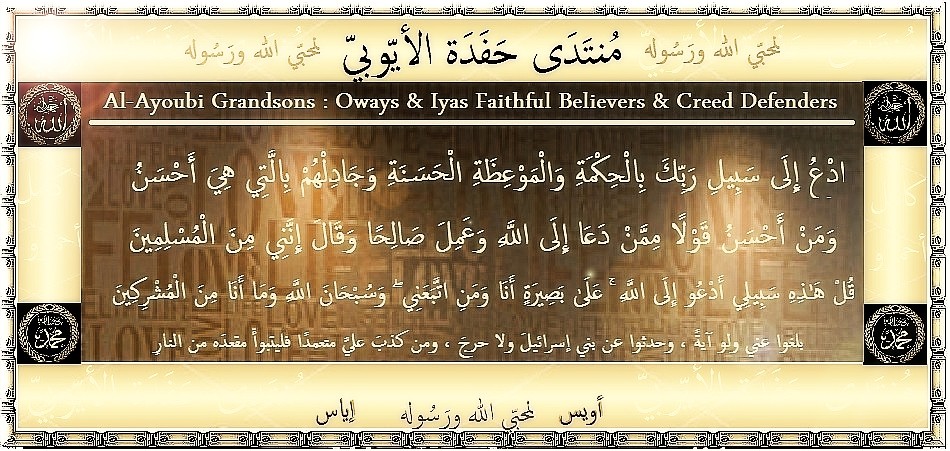الداعية للخير
داعية نشيط

عدد المساهمات : 543
تاريخ التسجيل : 30/12/2009
العمر : 34
الموقع : yahoo.com
 |  موضوع: The blessed Month of Ramadan in Brief موضوع: The blessed Month of Ramadan in Brief  الثلاثاء يونيو 10, 2014 9:16 pm الثلاثاء يونيو 10, 2014 9:16 pm | |
| The blessed Month of Ramadan in Brief

The Month of Qura'an

Allah Says in His Holy Book ( Quran ):
" The month of Ramadhan [is that] in which was revealed the Qur'an, a guidance for the people and clear proofs of guidance and criterion. So whoever sights [the new moon of] the month, let him fast it; and whoever is ill or on a journey - then an equal number of other days. Allah intends for you ease and does not intend for you hardship and [wants] for you to complete the period and to glorify Allah for that [to] which He has guided you; and perhaps you will be grateful." 2:185

What is Ramadan?
Ramadan is the ninth month of the Islamic lunar calendar. Every day during this month, Muslims around the world spend the daylight hours in a complete fast.
During the blessed month of Ramadan, Muslims all over the world abstain from food, drink, and other physical needs during the daylight hours. As a time to purify the soul, refocus attention on God, and practice self-sacrifice, Ramadan is much more than just not eating and drinking.
Fasting Ramadan is the third "pillar" or religious obligation of Islam, fasting has many special benefits. Among these, the most important is that it is a means of learning self-control. Due to the lack of preoccupation with the satisfaction of bodily appetites during the daylight hours of fasting, a measure of ascendancy is given to one's spiritual nature, which becomes a means of coming closer to God. Ramadan is also a time of intensive worship, reading of the Qur'an, giving charity, purifying one's behavior, and doing good deeds.
Muslims are called upon to use this month to re-evaluate their lives in light of Islamic guidance. We are to make peace with those who have wronged us, strengthen ties with family and friends, do away with bad habits -- essentially to clean up our lives, our thoughts, and our feelings. The Arabic word for "fasting" (sawm) literally means "to refrain" - and it means not only refraining from food and drink, but from evil actions, thoughts, and words.
During Ramadan, every part of the body must be restrained. The tongue must be restrained from backbiting and gossip. The eyes must restrain themselves from looking at unlawful things. The hand must not touch or take anything that does not belong to it. The ears must refrain from listening to idle talk or obscene words. The feet must refrain from going to sinful places. In such a way, every part of the body observes the fast.
Therefore, fasting is not merely physical, but is rather the total commitment of the person's body and soul to the spirit of the fast. Ramadan is a time to practice self-restraint; a time to cleanse the body and soul from impurities and re-focus one's self on the worship of God.
Although Muslims practice Islam in various ways every day, the holy month of Ramadan is an especially religious time. One of the pillars of Islam is fasting during Ramadan. During daylight hours for this entire month, Muslims must voluntarily abstain from indulging in physical desire, which includes
eating
drinking
smoking
chewing gum
having sex
Exceptions
Certain groups of people are exempt from fasting, but are expected to make up the missed days during a later month:
Menstruating and postpartum women*
Pregnant and breast-feeding women
Travelers
Anyone who feels sick or weak
*These women are considered unclean and are forbidden to pray, thus forbidden to fast. The three other groups have the option to fast if they so desire.
In addition, children before puberty do not have to fast, although their parents usually choose to gradually introduce them to all-day fasting by having them fast for a half-day.
The many purposes of Ramadan
Self-control
Muslims learn self-control by ignoring their desires for physical fulfillment like food, drink, sex, etc., and thus open themselves more fully to spiritual fulfillment.
Reminder of spiritual duties
The holy month of Ramadan is an opportunity for Muslims to remember what and why they believe and to fulfill the pillars of Islam. For example, those who have reduced the frequency of their prayers during the other months of the year will be reinspired to pray five times a day during Ramadan. Alms-giving is also much more common during Ramadan.
Unity
Since all healthy Muslims are expected to fast, a certain unity is felt both between Muslims around the world and between neighboring Muslims of all classes (income levels). This unity between classes also reminds Muslims of their alms-giving duties.
At sunset, Muslims break the fast with a feast called " fotoor " (breakfast). They eat a second large meal at midnight and a third, smaller one just before dawn. At dawn the fasting begins all over again.
Ramadan lasts for about 29 days - one lunar month. Islam is based on a lunar calendar, which is slightly shorter than the solar calendar, and thus the dates of Ramadan are slightly earlier every year.
| |
|




